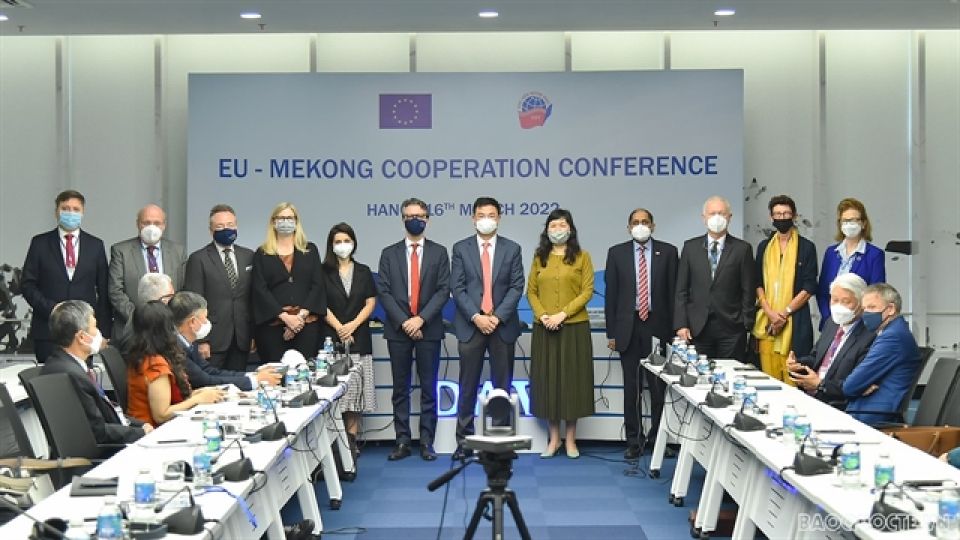March 18, 2022
HANOI — Opportunities and challenges to the collaboration of the EU and Mekong countries was the main theme of the EU-Mekong Cooperation Conference held in Hà Nội on Wednesday.
This is the first time that Việt Nam has hosted the EU-Mekong Cooperation Conference.
Taking place at the Diplomatic Academy of Việt Nam, the hybrid conference gathered over 50 onsite and more than 100 online delegates of diplomats, government officials, academics and journalists from Europe and Mekong countries.
“The EU would like to strengthen our involvement with the Mekong sub-region, and this conference can provide useful inputs for our further reflection,” said Gunnar Wiegand, Managing Director for Asia-Pacific at the European External Action Service in his keynote address.
“We will continue to promote public and private green investments in the Mekong sub-region and support THE sustainable and just development and post-COVID-19 recovery of the region.”
The one-day conference was divided into four main sessions: Assessment of EU-Mekong cooperation; Examination of major trends in the Mekong subregion and how they are affecting sustainable development; Opportunities and challenges for Mekong’s sustainable development; and opinions from Europe in strengthening cooperation between the EU, its member states, the Mekong countries and the entire sub-region.
“Many global challenges come together in the Mekong, making it an interesting place for developing solutions in the field of climate action, water security, clean energy, agriculture, transport and infrastructure,” said Giorgio Aliberti, the European Union Ambassador to Việt Nam.
In the Mekong Delta, European Partners are committing 70 interventions, which are worth a total of 548 million euros (US$605 million). These interventions are in line with policies such as the European Green Deal, the Paris Agreement, the SDG 2030 Agenda and Việt Nam’s Socio-Economic Development Strategy.
“We really appreciate the participation of partners such as the EU, which are very constructive” said Phạm Quang Hiệu, Deputy Minister of Foreign Affairs.
“A stronger, more connected Mekong subregion will help build the ASEAN community and strengthen ASEAN’s position in the region,” said Hiệu.
The conference’s experts recommends that Mekong countries must aim for sustainable development, as well as broader, greener policies. Partners within and outside the subregion further support Mekong countries’ efforts in managing water resources.
Experts also suggested the European Union and its member states take a broad and synchronised approach to cooperate effectively with Mekong countries.
The EU and its member states have for many years been one of the major partners and supporters of the Mekong River Commission. As the only treaty-based organisation, the EU sees the MRC as a driver for regional cooperation and integration. The EU is currently supporting the MRC through a 5 million euro grant, which runs until the end of the year.
The overall objective is the integrated and sustainable management of natural resources in Lower Mekong, contributing to sustainable development.
The EU is also a major donor to the individual countries of the region and has just adopted new seven-year development cooperation programmes with Cambodia, Laos, Thailand and Việt Nam.
The Mekong region also benefits from several EU-funded regional programmes focused on socio-economic development, connectivity, water and sanitation, migration, biodiversity, forest governance and wildlife trafficking, climate-smart agriculture and support to civil society organisations and indigenous people.
Delegates all expressed the hope that knowledge gained from the conference would serve as a launchpad for future cooperation projects between the EU and Mekong nations.


